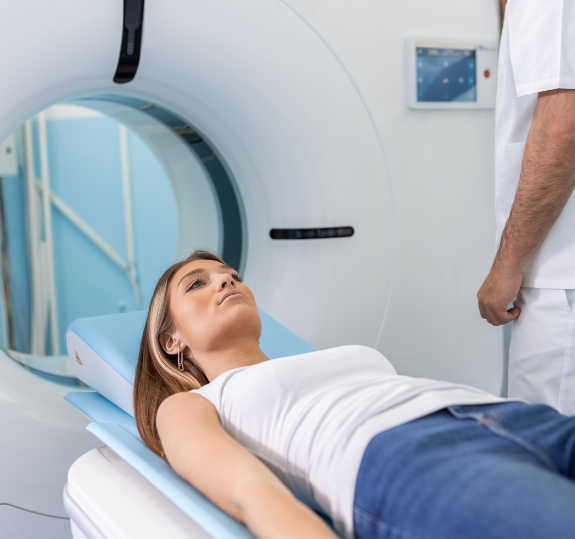By Dr. Varvara Mazina, Elliot Hospital
As a gynecologic oncologist, I’ve dedicated my career to understanding and treating endometrial cancer, a condition that affects tens of thousands of American women each year. Early detection improves the prognosis, so it is important to be educated about this disease and know its common symptoms and causes. Most women with endometrial cancer have an excellent prognosis, thanks to recent medical advancements and new technologies for treatment such as the use of indocyanine green (ICG) dye for identifying sentinel (signal) lymph nodes.
 Understanding Endometrial Cancer
Understanding Endometrial Cancer
Endometrial cancer occurs when abnormal cells in the lining of the uterus (endometrium) grow out of control. There are two types of endometrial cancer. Type I endometrial cancer (low grade endometrioid adenocarcinoma) is the most common. This type is less aggressive and has a better prognosis when detected early. Type II endometrial cancers are rarer. They tend to grow and spread quickly outside the uterus.
Risk Factors for Endometrial Cancer
While the exact cause of endometrial cancer is unknown, several factors may increase the risk of developing this condition. These include:
- obesity – due to higher levels of estrogen leading to hormone imbalance which may overstimulate cells in the uterine wall
- hormone therapy – such as tamoxifen, to treat breast cancer may increase the risk of developing endometrial cancer. However, the possible reduction in the risk of breast cancer recurrence may surpass these risks.
- genetics- a family history of Lynch syndrome leading to inherited colorectal, endometrial and ovarian cancers
- early onset of menstruation or late menopause- a higher number of menstrual cycles exposes the uterine lining to more estrogen
- diabetes
- history of certain conditions leading to infrequent ovulation, such as polycystic ovary syndrome (PCOS) or endometrial hyperplasia
Recognizing Common Symptoms
Early detection is crucial for effective treatment. Women should be aware of symptoms such as:
- any amount of vaginal bleeding after menopause
- heavy or irregular vaginal bleeding or discharge before menopause
- pelvic pain
- difficulty urinating or defecating
- unexpected weight loss
If you experience any of these symptoms, it’s essential to consult with your health care provider promptly.
Diagnostic Methods 
Diagnosing endometrial cancer typically involves a combination of pelvic examination, imaging tests (such as ultrasound, CT, or MRI), and tissue biopsy. These procedures help determine the extent of the disease and guide treatment decisions.
Treatment Options
Treatment for endometrial cancer depends on various factors, including the stage of the disease, the patient’s overall health, and personal preferences. Common treatments include surgery, radiation therapy, chemotherapy, and hormone therapy. In some cases, a combination of these approaches may be recommended to achieve the best possible outcome.
Innovative Treatments After an Endometrial Cancer Diagnosis
Advancements in medical technology have revolutionized the treatment for endometrial cancer. One such innovation available at Elliot Hospital is the use of indocyanine green (ICG) dye for identifying sentinel lymph nodes. During surgery, a small amount of ICG dye is injected into the uterus, which then travels through the lymphatic system, highlighting the sentinel lymph nodes. This technique allows for precise removal of the appropriate lymph nodes, reducing the risk of complications and improving outcomes.
A second technology we use is called immunotherapy. This treatment uses the body’s immune system to identify and destroy cancer cells. Immunotherapy is particularly effective in patients with advanced or recurrent endometrial cancer. By targeting specific molecules or proteins expressed by cancer cells, immunotherapy can unleash a strong immune response against tumors. Pairing immunotherapy with traditional treatments like chemotherapy or targeted therapies improves outcome for patients with advanced or recurrent cancer for whom previously there were not many treatment options.
Learn More About Cancer Care at Elliot Hospital
The Importance of Support
A diagnosis of endometrial cancer can be overwhelming, both emotionally and physically. It’s essential for patients to have a strong support network comprising family, friends, and health care professionals who can provide guidance, encouragement, and assistance throughout their journey. My colleagues Elliot Hospital and I pride ourselves on patient-centered care. We strive to educate and support each patient throughout their endometrial cancer journey.
While endometrial cancer poses significant challenges, advancements in research and treatment offer hope for improved outcomes. By understanding the symptoms, causes, and available treatment options, women can take proactive steps to protect their health and well-being.
Varvara Mazina, MD, was born in St. Petersburg, Russia and moved to the United States with her family at age 13. She graduated from Stanford University with a degree in Human Biology. Dr. Mazina received her medical degree and completed her obstetrics and gynecology residency at the University of Washington School of Medicine. She completed her fellowship in gynecologic oncology at Massachusetts General Hospital. She’s an Instructor in Obstetrics, Gynecology and Reproductive Biology at Harvard Medical School. She serves as a Non-Resident Tutor at Lowell House at Harvard University, mentoring undergraduate students applying to medical school.
Dr. Mazina’s research interests include multidisciplinary and translational collaboration for management of gynecologic malignancies, surgical innovation and education, and improvement of quality of life of cancer patients and survivors.
In her spare time, Dr. Mazina loves spending time with her two children and husband – visiting new playgrounds, hiking, sailing, skiing or just being outside.
